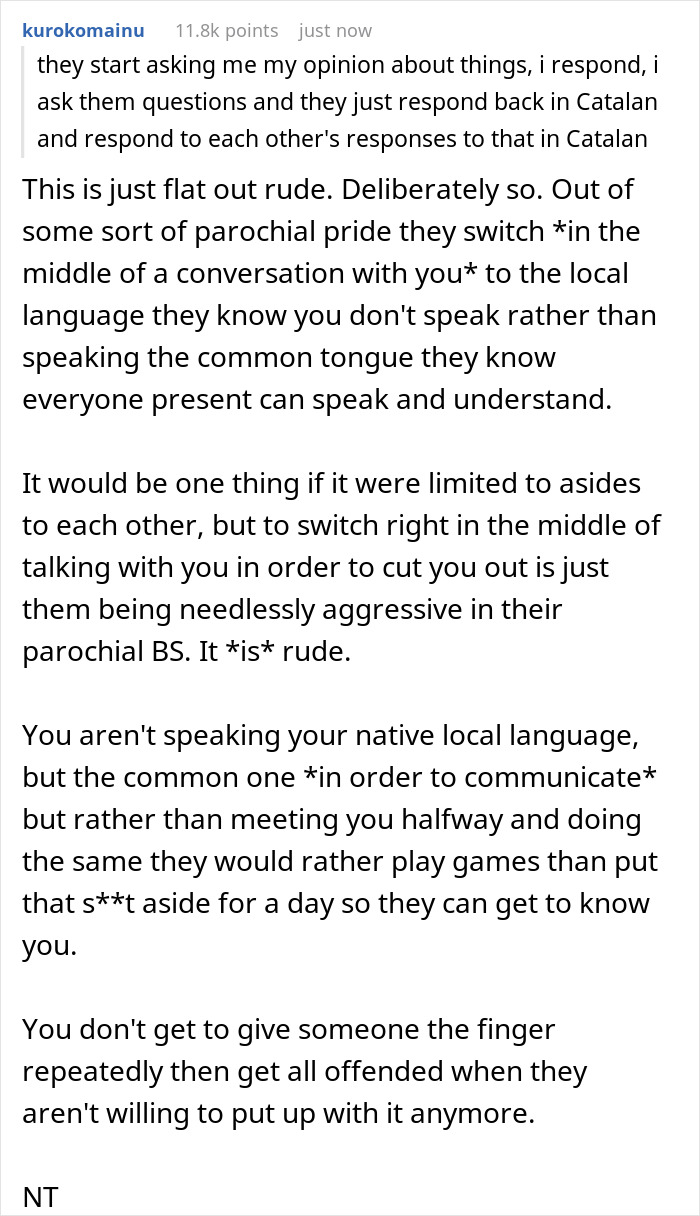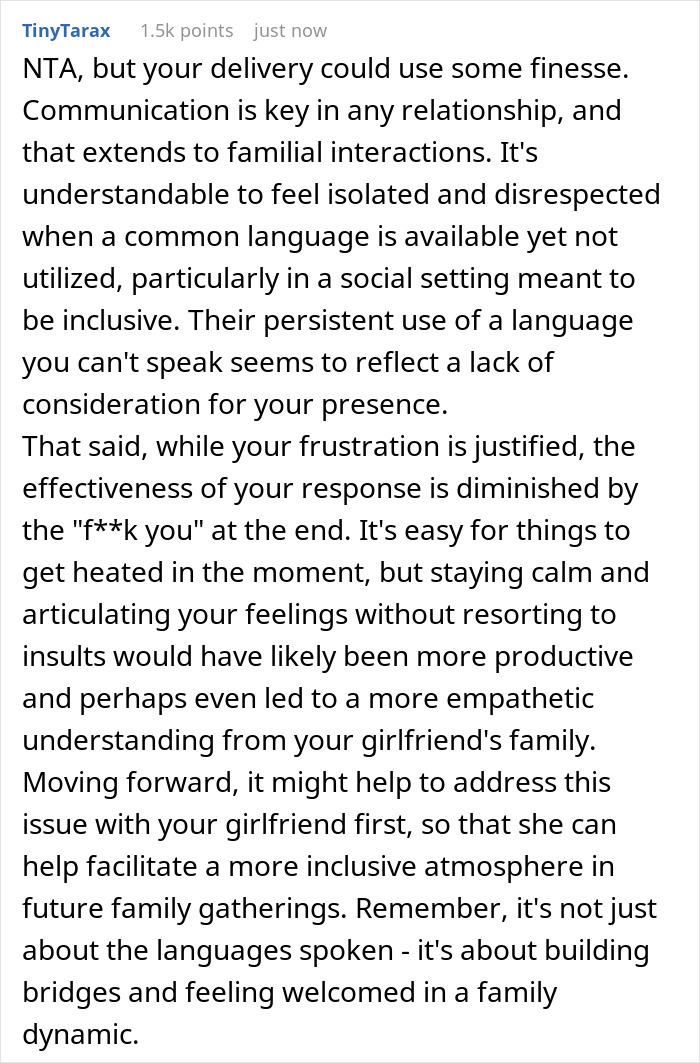It would seem to be obvious that you should communicate in a language that everyone can understand if you are interacting socially with someone who is foreign-born or who doesn’t speak the same language as you. It’s not only basic manners and respect but also, you show that you want that person to feel welcome.
However, it looks like it’s not obvious for everybody. One Reddit user shared his story online after he stormed off from dinner with his girlfriend’s family as they kept speaking in a language that he doesn’t understand.
More info: Reddit
Refusing to switch to a language that everybody would understand because you hate to speak it – well, it’s extremely impolite

Image credits: fauxels (not the actual photo)
This man shares that he and his girlfriend are from different regions of Spain and she speaks Catalan, which he doesn’t; however, in Spain, everybody speaks Castilian Spanish
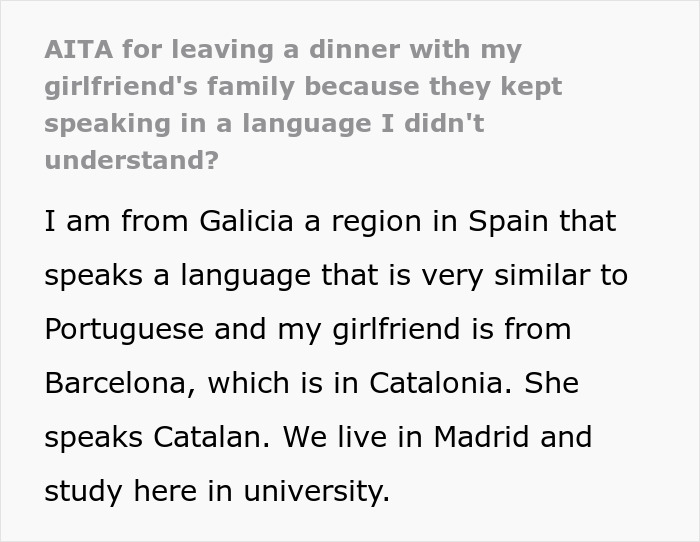


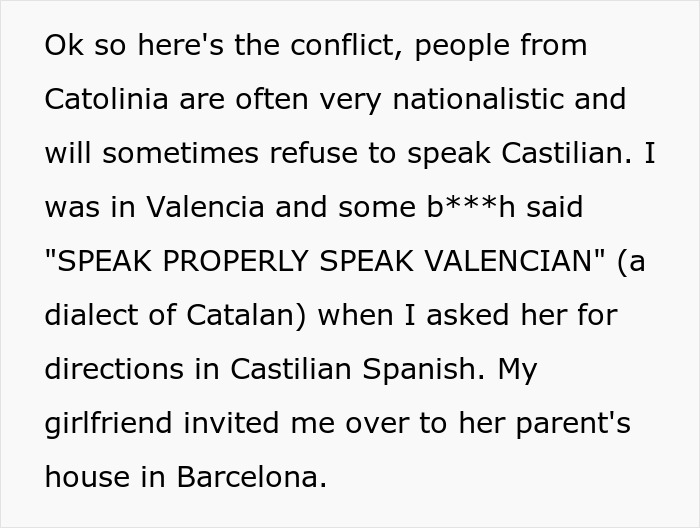

Image credits: Eder Pozo Pérez (not the actual photo)
One day his girlfriend invited him over to her parents’ house, where they greeted him in Catalan and he answered in Castilian, informing them that he doesn’t speak Catalan

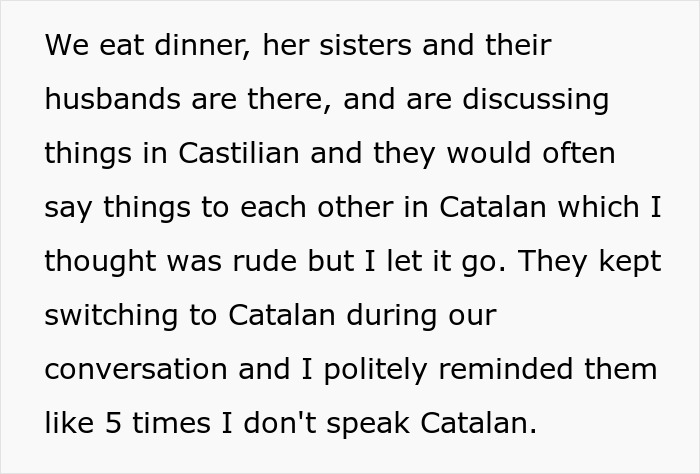

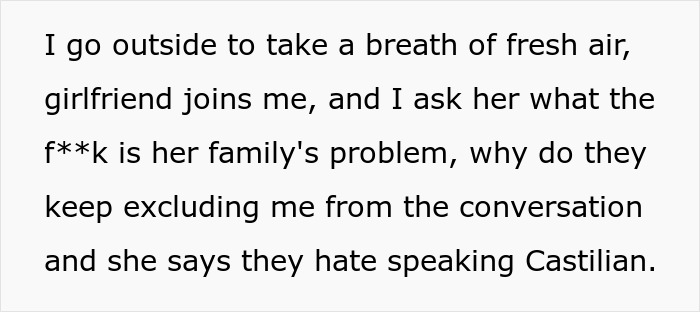


Image credits: Engin Akyurt (not the actual photo)
The man noted that as they ate dinner, they made some conversation in Castilian, but the GF’s family would often switch to Catalan despite his reminders that he doesn’t understand
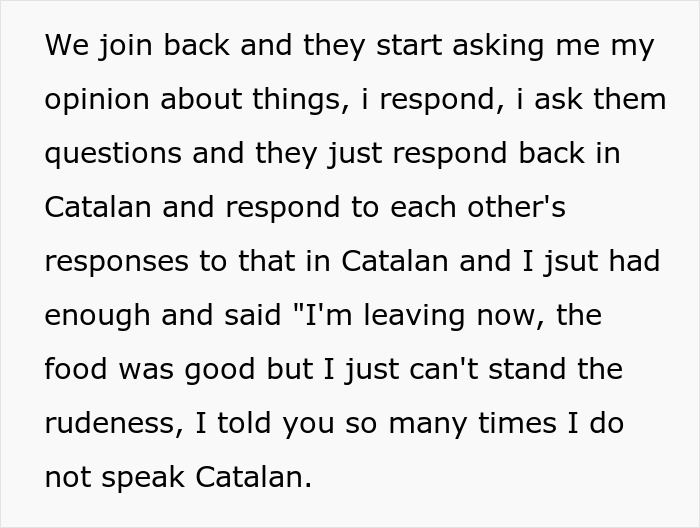



Image credits: Puzzleheaded-Owl4052
However, after a few more instances, the man had had enough and decided to leave, causing a lot of drama and exchanging swears
A few days ago, a Reddit user shared his story online asking community members if he was being a jerk for leaving dinner with his girlfriend’s family because they kept speaking a language that he didn’t understand, despite his reminders. The post caught a lot of attention and collected over 8.3K upvotes and 2.7K comments.
The original poster (OP) starts his story by giving a little background, sharing that he’s from a region in Spain that speaks a language similar to Portuguese while his girlfriend is from Barcelona and speaks Catalan. He noted that everyone in Spanish speaks Castilian, at least the basics. Now, his girlfriend invited him over to her parents’ home, where they greeted him in Catalan and he informed them that he doesn’t speak it.
They ate dinner, his GF’s sisters and their husbands were there, and everybody was discussing things in Castilian, but they would still often switch to say something between each other in Catalan, despite the man’s polite reminders that he didn’t understand. After a while, since the situation didn’t change, OP had had enough and announced that he was leaving as he didn’t feel welcome.
This caused a lot of drama, with the girlfriend’s father complaining that they prepared a big meal and the man complaining that they didn’t even respect him enough to speak in a common language that everybody understood.
Community members backed the man up in this situation and gave him the ‘Not the A-hole’ badge. “NTA. it’s disrespectful to speak in a different language in front of the guest. they should know better,” one user shared. “I was going to go with E S H, until you said explicitly that you would ask a question and they would respond to you in Catalan. It would be different if you were just upset they were having side conversations in Catalan without you,” another added.

Image credits: Kampus Production (not the actual photo)
“There’s a HUGE difference between being in a family situation where the other party DOES speak a common language yet refuses to speak it versus DOES NOT,” shared Diane, the creator of Oui In France, an American expat from New Jersey who’s living now in a region in the West of France with her French husband, in an interview with Bored Panda.
“It’s incredibly important to be aware of the dominant language in a given social setting and do our best to accommodate all parties whenever possible,” she pointed out. “If there’s no common language, someone is going to have to act as a translator.” She added that making sure everyone is at ease and assigning multiple persons to serve as translators so that the burden isn’t placed entirely on one person at a time is the kind thing to do. However, that isn’t always feasible.
Speaking about the emotional impact of feeling isolated from conversations due to language barriers, Diane emphasized that it’s easy to get angry or shut down, especially when no one seems to be translating to you, but maybe even more so if there’s a common language but people aren’t speaking it.
So if you are navigating similar challenges with language proficiency, Diane noted that it’s really important for the language expectations to be communicated ahead of time whenever possible. “I think it’s important as well for the person who doesn’t speak the language to accept that they aren’t going to be able to communicate like they do in their native tongue and they may miss parts of the conversation or not be able to express themselves. It’s part of the process so don’t get upset about it.”
Finally, Diane pointed to a post she wrote sharing tips on when the foreign in-laws meet each other that would have been useful for the characters of this story as well. “Make sure mealtimes aren’t overly dominant in one language and that someone is always jumping in to always translate. This is important because no one wants to feel left out, but at the same time, no one wants to feel like they’re a burden either and constantly asking what is being said.”
“It’s our responsibility to make sure the parents are always involved and are a part of the conversation, on both sides. So someone needs to jump in, always, and provide a quick explanation of commentary, jokes, and everything else. It’s the polite thing to do and goes a long way toward the overall harmony of the meal.”
So what do you guys think about this situation? Did the man overreact, or should his girlfriend have stepped in and said something? Share your thoughts in the comments below!
Redditors discussed that it was rude, especially as they know the common language and just refuse to speak it
